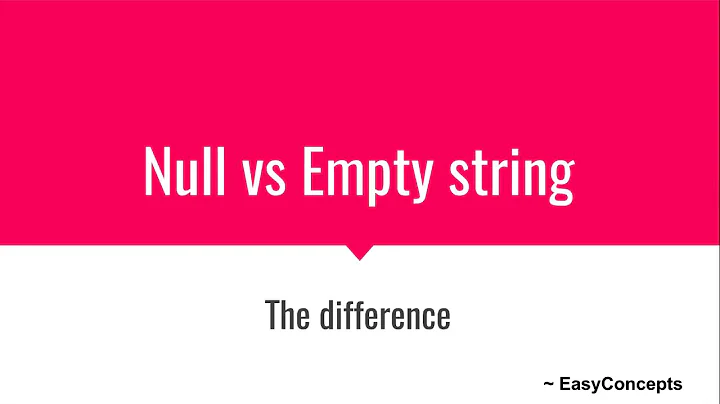Convert.ToInt32(String) on String.Empty vs. Null
I have absolutely no insight into the actual design team's reasoning behind this, but it seems to me that it might be some sort of "default value equivalency". Null is the default value of string, so it seems logical to convert it to a default value of int. String.Empty is however a string like any other non-null string data, so it is expected to be formatted, hence the exception.
I think ArgumentNullException would have been a "cleaner" decision, but I don't know whatever internal issues may be behind this all...
Another edit:
There, right in the MSDN documentation, one of the 5 possible outcomes:
A successful conversion. For conversions between two different base types not listed in the previous outcomes, all widening conversions as well as all narrowing conversions that do not result in a loss of data will succeed and the method will return a value of the targeted base type.
It seems the conversion from null object to another type has no reason to fail (not a format error, not an unsupported type conversion), but a value type such as int has no representation of "no data", so a default value of the target type is produced.
A quick thought - the "opposite" conversion, Convert.ToString(0), does not yield null because:
- 0 is data, it can be very valid and important value in many cases
- null is not a correct string representation of 0
Related videos on Youtube
MCattle
Software developer who's been working with .Net since 1.0, and several obscure languages before that (remember Miranda, or Mex?)
Updated on July 09, 2022Comments
-
MCattle almost 2 years
The expression
Convert.ToInt32(String.Empty)will raise a FormatException because it cannot parse an empty string into an Int32 value.However, the expression
Convert.ToInt32(DirectCast(Nothing, String))in VB.NET orConvert.ToInt32((string)null)in C# will parse the null to an Int32 value of zero.Digging into the .NET source in
Convert.cs, I see the following code:public static int ToInt32(String value) { if (value == null) return 0; return Int32.Parse(value, CultureInfo.CurrentCulture); }This explains the behaviour, but I'd like to understand why it was written this way, instead of returning a zero for an empty string as well?
For example, why wasn't it written as:
public static int ToInt32(String value) { if (String.IsNullOrEmpty(value)) return 0; return Int32.Parse(value, CultureInfo.CurrentCulture); }(Note that
String.IsNullOrEmpty()andConvert.ToInt32()both date back to .NET 2.0, possibly earlier.)Edit: My question is very similar to this question, but I'd also like to know why
Convert.ToInt32(String.Empty)raises an exception instead of returning the Int32 default value of0. (The answer being thatString.Emptyis not the default value ofString, so there's no correlation.)-
Jon Skeet about 11 yearsNull can be viewed as an absence of data - whereas an empty string is a string, just an empty one... and that's not a number. (Personally I'd prefer it not to be so lenient with null, but that's a different matter.)
-
 Matthew Watson about 11 years+1 for interesting question. I'd have expected it to throw an exception, just like passing "" will. Especially when Int32.Parse(null) throws an exception! (Ok, ok, it's the subtle difference between converting and parsing - but even so...)
Matthew Watson about 11 years+1 for interesting question. I'd have expected it to throw an exception, just like passing "" will. Especially when Int32.Parse(null) throws an exception! (Ok, ok, it's the subtle difference between converting and parsing - but even so...) -
 yairr about 11 yearsIf you really want to blow your mind with this type of question compare and contract SQL
yairr about 11 yearsIf you really want to blow your mind with this type of question compare and contract SQLNULLvs C#null. -
Andre Loker about 11 yearsInteresting question. TBH I think it's a bad design choice. Neither null nor "" are valid integers in my opinion and both should cause an exception.
-
Steven about 11 yearsI would expect this API to throw a NullReferenceException, not returning the default value. Looking at the rest of the .NET framework API, that would be theost reasonable thing to do.
-
 JDB about 11 yearsAs the votes currently stand, the second answer to the "duplicate" question answers this question (the "why" part): stackoverflow.com/a/11580256/211627
JDB about 11 yearsAs the votes currently stand, the second answer to the "duplicate" question answers this question (the "why" part): stackoverflow.com/a/11580256/211627 -
 Anthony Pegram about 11 yearsI worked* on a legacy app, and you would be surprised at how many places it was literally hardcoded as
Anthony Pegram about 11 yearsI worked* on a legacy app, and you would be surprised at how many places it was literally hardcoded aslong someValue = Convert.ToInt64(null);Maddening. That was my first introduction to this behavior, because at first sight, I was convinced it was a ticking time bomb. -
SASS_Shooter about 11 yearsI'm only guessing on this, haven't learned to read Anders' mind yet, but all value types have a default of natural 0. So they may say null defaults to natural zero, while an empty string (as said by Skeet) is just a string.
-
 Matthew Watson about 11 years>but all value types have a default of natural 0.< Well you might think that, but then why does Convert.ToChar(null) throw an exception? ;) (Answer: Because Char isn't a numeric type.)
Matthew Watson about 11 years>but all value types have a default of natural 0.< Well you might think that, but then why does Convert.ToChar(null) throw an exception? ;) (Answer: Because Char isn't a numeric type.)
-
-
MCattle about 11 yearsI'll accept this as it scratches my curiosity itch. The "VB6 Legacy Support" answer in stackoverflow.com/questions/11580208/… that @Cyborgx37 posted in a comment to the original question also appears to be a valid reason to me.
-
 Honza Brestan about 11 yearsVery interesting. Also relevant to today's XKCD strip :) xkcd.com/1172
Honza Brestan about 11 yearsVery interesting. Also relevant to today's XKCD strip :) xkcd.com/1172 -
Jonathan over 9 yearsI don't think that rationale holds since according to the MSDN link a FormatException should be thrown since "A string to be converted to any numeric type is not recognized as a valid number.".
-
nawfal almost 9 years@HonzaBrestan not sure how you would then explain int.Parse(null) giving exceptions. Weird choice but my reasoning will be like "because documentation says so".






